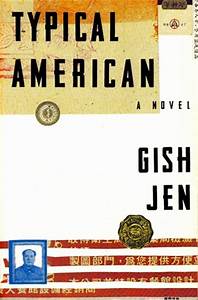Typical American
I enjoyed the opening chapters of the book where we find Ralph getting settled into his life in America and learning the English language. Some of the scenes are just plain hilarious, such as when Cammy is trying to fill out a form and is asking for Ralph’s name: "'English name,’ she said again, finally. She showed him her typewriter, the form she had to fill out. ‘No English name.’ How to say initials? He was sorry to disappoint her. Then he brightened. ‘You give me.'" The conversation continues, however, and points to the euphoric effect of language-learning: '"I-give-you-a-name?’ ‘Sure. You give.’ There was something about speaking English that carried him away.'" This last sentence in particular reminded me of some of my own experiences of learning Spanish while living in Venezuela. Not being fluent in Spanish, I often planned my attack when I needed to engage someone in conversation. What should I say to get her attention? What is the word for light bulb? OK, I think I’m ready. Let’s do it. Being understood was a huge high, since my new language skills were largely untested, like a newly made key to a door. Every time I spoke and was understood it was like the entire country of Venezuela opened up before me. The oddity and strangeness that the language gave to everything temporarily disappeared. Wow, I would think, he actually understood me. This is cool.
* * * * *
There are some very well written passages in the novel. Here’s one from the Basement chapter, where Ralph has just about bottomed out: “And then there was another pain too, quieter, weightier, its roots in what everybody knows – that one day a person looks back more than forward, that one day he’ll have achieved as much as he was going to, loved as much as he was going to, been as happy as it was granted him to be.” There is a parallel here with what I mentioned earlier concerning separation and nostalgia, for a few lines down, we read these lines: “the world he had lost had waxed valuable in the losing, like an unwon love.” And so it is that Ralph is nostalgic for his home back in China, but even he concedes that he is distorting the reality of the past: “It was no golden time. He might gild it but in truth it was lacking. Lacking what? Something, everything, he didn’t know exactly.” It is the “lacking” that really touches on a universal theme in the novel. Despite his past, despite his future successes, Ralph never seems to be completely at rest. He never feels as though he can finally relax and just mindlessly enjoy something. He experiences many successes and yet never feels or thinks that he has arrived, that the American Dream is his.
* * * * *
There are some very well written passages in the novel. Here’s one from the Basement chapter, where Ralph has just about bottomed out: “And then there was another pain too, quieter, weightier, its roots in what everybody knows – that one day a person looks back more than forward, that one day he’ll have achieved as much as he was going to, loved as much as he was going to, been as happy as it was granted him to be.” There is a parallel here with what I mentioned earlier concerning separation and nostalgia, for a few lines down, we read these lines: “the world he had lost had waxed valuable in the losing, like an unwon love.” And so it is that Ralph is nostalgic for his home back in China, but even he concedes that he is distorting the reality of the past: “It was no golden time. He might gild it but in truth it was lacking. Lacking what? Something, everything, he didn’t know exactly.” It is the “lacking” that really touches on a universal theme in the novel. Despite his past, despite his future successes, Ralph never seems to be completely at rest. He never feels as though he can finally relax and just mindlessly enjoy something. He experiences many successes and yet never feels or thinks that he has arrived, that the American Dream is his.
